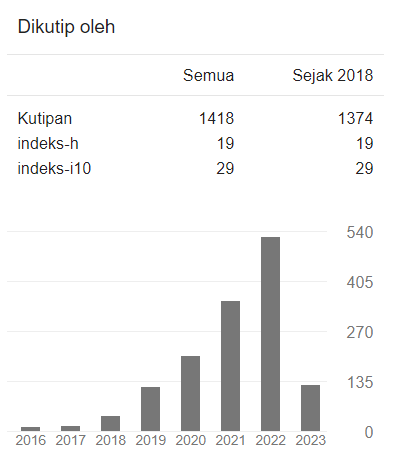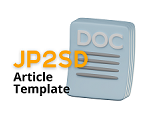Pengembangan Lembar Kerja Peserta Didik Berbasis Project Based Learning pada Materi Keragaman Sosial dan Budaya Indonesia di Sekolah Dasar
DOI:
https://doi.org/10.22219/jp2sd.v12i2.32660Keywords:
Lembar Kerja Peserta Didik, Project Based Learning, Materi Keragaman Sosial dan Budaya di IndonesiaAbstract
This study aimed to produce project-based learning Student Worksheets (LKPD) on social and cultural diversity material in Indonesia grade IV SDN 03 Pontianak Selatan which is suitable to be used to help the learning process in the independent curriculum. The study employed the Research and Development (R&D) method by adapting the ADDIE model. The subject of the study was a project-based learning LKPD on social and cultural diversity material in Indonesia, which was tested on 28 (twenty-eight) grade IV students and 2 grade IV teachers. Data collection techniques in this study are measurements and interviews—data measurement tools in the form of response questionnaires and interview guidelines. From the needs analysis, it was found that the LKPD used by teachers had not been designed by themselves; instead, they had been using available LKPDs. Teachers also complained when using these LKPDs because they did not explain the steps of the activities that students should do comprehensively. Additionally, teachers stated that materials containing various forms of social and cultural diversity in Indonesia are challenging to deliver due to the vast diversity spread throughout the Indonesian territory. Before being tested, the product was validated by validators who then obtained a feasibility assessment of material expert validators on the content feasibility aspect of 91.25% with the "Very Valid" criteria, linguist validators on the linguistic feasibility aspect of 93% with the "Very Valid" criteria, and design experts on the graphic feasibility aspect of 95.71% with the "Very Valid" criteria. Furthermore, product trials through responses obtained "Very Decent" from teachers amounted to 95.83%. In comparison, responses from small group students amounted to 83.85% with the criteria "Very Good," and large group responses amounted to 86.75% with the criteria "Very Good". Thus, it is concluded that project-based learning student worksheets on social diversity and crocodile materials in Indonesia are very feasible to be used in the learning process.
Downloads
References
Asha, A., Halidjah, S., & Ghasha, D. A. V. (2023). Pengembangan LKPD Berbasis Lingkungan Sekitar Sebagai Sumber Belajar dalam Pembelajaran Tematik Kelas V SD Negeri 74 Pontianak Barat. Journal on Education, 6(1), 6770-6781
Aulia, D. (2023). Analisis Kebijakan Kurikulum Merdeka Melalui Implementasi Proyek Penguatan Profil Pelajar Pancasila di Sekolah Dasar. Jurnal Pemikiran dan Pengembangan Sekolah Dasar (JP2SD), 11(1), 122-133.
Dadi, S., Yuliantini, N., & Setiono, P. (2020). Strategi pengembangan RPP melalui model pembelajaran Project Based Learning. Jurnal Pemikiran dan Pengembangan Sekolah Dasar (JP2SD), 8(1), 10-18.
Effendi, R., Herpratiwi, H., & Sutiarso, S. (2021). Pengembangan LKPD Matematika Berbasis Problem Based Learning di Sekolah Dasar. Jurnal Basicedu, 5(2), 920-929.
Elyasmad, E., Suparjan, S., Pranata, R., Halidjah, S., & Ghasya, D. A. V. (2022). Pengembangan Lembar Kerja Peserta Didik Berbasis Project Based Learning Kelas V SD Negeri 36 Pontianak Kota. FONDATIA, 6(4), 1012-1027.
Fitriyah, C. Z., & Wardani, R. P. (2022). Analisis kebutuhan pengembangan LKPD berbasis kearifan lokal daerah Banyuwangi di Sekolah Dasar. Jurnal Pemikiran Dan Pengembangan Sekolah Dasar (JP2SD), 10(1), 62-73.
Gustiawati, R, D Arief, and A Zikri. (2020). Pengembangan Bahan Ajar Membaca Permulaan Dengan Menggunakan Cerita Fabel Pada Siswa Sekolah Dasar . Jurnal Basiced, 4(2): 2580–1147.
Hairida, H. (2017). Pengembangan Instrumen untuk Mengukur Self Efficacy Siswa dalam Pembelajaran Kimia. Edusains UIN Syarif Hidayatullah, 9(1), 177946.
Hairida, V. S. (2020). Journal of Educational Science and Technology. Journal of Educational Science and Technology, 6(2), 106-116.
Istiqomah, E. (2021). Analisis Lembar Kerja Peserta Didik (LKPD) Sebagai Bahan Ajar Biologi. Alveoli: Jurnal Pendidikan Biologi, 2(1), 1-15.
Kurniasih, I. (2022). A-Z Merdeka Belajar + Kurikulum Merdeka. Yogyakarta: Kata Pena.
Lestari, A., Hairida, H., & Lestari, I. (2021). Pengembangan Lembar Kerja Peserta Didik (Lkpd) Berbasis Discovery Learning Pada Materi Asam Dan Basa. Jurnal Zarah, 9(2), 117-124.
Hidayat, T., Halidjah, S., & Ghasya, D. A. V. (2023). Pengembangan LKPD Berbasis Problem Based Learning Pembelajaran IPAS Kelas IV di SDN 03 Pontianak Selatan. AS-SABIQUN, 5(5), 1371-1387.
Martania, A., Hairida, H., Muharini, R., Enawaty, E., & Rasmawan, R. (2023). Pengembangan Lembar Kerja Peserta Didik (LKPD) Berbasis Kearifan Lokal pada Materi Zat Aditif. Jurnal Education And Development, 11(2), 58-65. DOI: 10.37081/ed.v11i2.4677.
Masitoh, L. F., & Aedi, W. G. (2020). Pengembangan Instrumen Asesmen Higher Order Thinking Skills (HOTS) matematika Di SMP kelas VII. Jurnal Cendekia: Jurnal Pendidikan Matematika, 4(2), 886-897.
Mudrikah, S., Pahleviannur, M. R., Surur, M., & Rahmah, N. (2021). Perencanaan Pembelajaran di Sekolah Teori dan Implementasi. Jawa Tengah: Pradina Pustaka
Nurani.D., Anggraini, L., Misiyanto., & Mulia., K. R. (2022). Serba-Serbi Kurikulum Merdeka Kekhasan Sekolah Dasar. Jakarta: Tim Pusat Kurikulum dan Pembelajaran (Puskurjar), BSKAP.
Pratiwi, D. E. (2020). Pengembangan buku ajar IPA SD melalui pendekatan konsep cinta keberagaman suku bangsa dan budaya Indonesia. Jurnal Pemikiran Dan Pengembangan Sekolah Dasar (JP2SD), 8(1), 35-50.
Retno, R. S. (2022). Analisis penerapan model pembelajaran project based learning berbasis content video pada pembelajaran konsep dasar sains mahasiswa. Jurnal Pemikiran dan Pengembangan Sekolah Dasar (JP2SD), 10(1), 1-11.
Rezeki, S., Kartono, K., & Pranata, R. (2023). Pengembangan LKPD Berbasis Problem Based Learning pada Pembelajaran Tematik di Kelas V SD Negeri 28 Pontianak Selatan. Journal on Education, 6(1), 7806-7815.
Sakilah., dkk. (2020). Pengaruh Project Based Learning terhadap Motivasi Belajar Sekolah Dasar Negeri 167 Pekanbaru. Journal of Madrasah Ibtidaiyah Education. 4(1): 127-124.
Stavinibelia, S. (2023). Pengaruh Model Project-Based Learning Terhadap Kemampuan Penalaran Peserta Didik Dalam Pembelajaran IPA Di Sekolah Dasar. Jurnal Pendidikan dan Konseling (JPDK), 5(1), 5362-5367.
Sugiyono. (2022). Metode Penelitian & Pengembangan Research and Development. Bandung: Alfabeta.
Susilowati, A., & Sutama, S. (2022). Kesulitan Belajar IPS Pada Siswa Sekolah Dasar: Studi Pada SD Muhammadiyah Kota Bangun, Kutai Kartanegara. JIPSINDO (Jurnal Pendidikan Ilmu Pengetahuan Sosial Indonesia), 9(1), 31-43. DOI: 10.21831/jipsindo.v9i1.47123.
Triana, N. (2021). LKPD Berbasis Eksperimen: Tingkatkan Hasil Belajar Siswa. Jawa Barat: Guepedia.
Widyastuti, A. (2022). Implementasi Project Based Learning pada Kurikulum 2022 Prototipe Merdeka Belajar. Jakarta: Elex Media Komputindo.
Downloads
Published
Issue
Section
License
Copyright (c) 2024 Ananda Febriyani Febriyani, Hairida, Dyoty Auliya Vilda Ghasya , Asmayani Salimi , Rio Pranata

This work is licensed under a Creative Commons Attribution-ShareAlike 4.0 International License.
Authors who publish with Jurnal Pemikiran dan Pengembangan Sekolah Dasar (JP2SD) agree to the following terms:
- For all articles published in Jurnal Pemikiran dan Pengembangan Sekolah Dasar (JP2SD), copyright is retained by the authors. Authors give permission to the publisher to announce the work with conditions. When the manuscript is accepted for publication, the authors agree to automatic transfer of the publishing right to the publisher.
- Authors retain copyright and grant the journal right of first publication with the work simultaneously licensed under a Creative Commons Attribution-ShareAlike 4.0 International License that allows others to share the work with an acknowledgment of the work's authorship and initial publication in this journal.
- Authors are able to enter into separate, additional contractual arrangements for the non-exclusive distribution of the journal's published version of the work (e.g., post it to an institutional repository or publish it in a book), with an acknowledgment of its initial publication in this journal.
- Authors are permitted and encouraged to post their work online (e.g., in institutional repositories or on their website) prior to and during the submission process, as it can lead to productive exchanges, as well as earlier and greater citation of published work (See The Effect of Open Access).

This work is licensed under a Creative Commons Attribution-ShareAlike 4.0 International License.


















